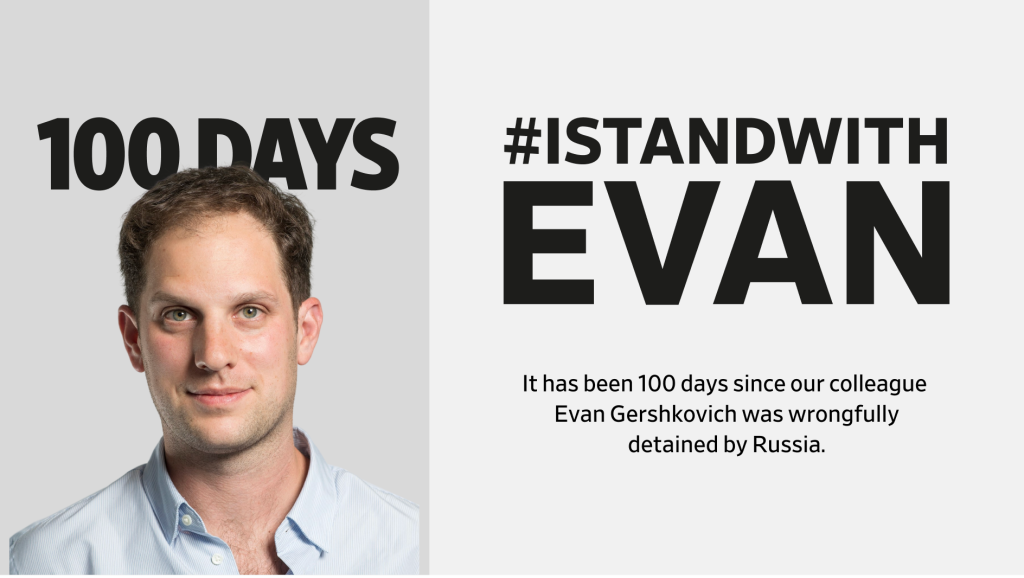Wall Street Journal reporter Evan Gershkovich will have spent 100 days behind bars as of Friday, July 7. Gershkovich, the newspaper’s accredited Russia correspondent, was reporting when he was detained and falsely accused of espionage. His employer vehemently denies the allegations, and CPJ, media organizations, and the U.S. government have called for his immediate release.
Russia continues to extend his pretrial detention, most recently on May 23. Meanwhile, consular access for U.S. officials has been restricted, though the U.S. ambassador to Russia was recently able to visit Gershkovich. He faces up to 20 years in prison under Russia’s criminal code.
CPJ’s 2022 prison census counted 19 journalists imprisoned in Russia due to their reporting, the highest number in the country since CPJ started keeping records in 1992.
Journalism is not a crime. Gershkovich is a journalist, not a spy, and should be released immediately and without conditions.
Dive deeper:
🎙️ Listen to CPJ expert Gulnoza Said speak on the Just Security podcast in April about how she expects Russia to handle Gershkovich’s detention
🔎 Check out our Ask Me Anything with Gershkovich’s editor Deborah Ball and CPJ President Jodie Ginsberg as they answer questions about his imprisonment and press freedom worldwide
🎥 Watch the International Journalism Festival panel, “#IStandWithEvan: Free Evan Gershkovich,” about the broader context and implications of his imprisonment. Panelists include CPJ’s president, The Wall Street Journal’s World Coverage Chief Gordon Fairclough, Global Head of Visuals Shazna Nessa, and editor-in-chief Emma Tucker; and Washington Post Opinions writer Jason Rezaian
⭐️ Join us on Twitter and tweet your support for Evan Gershkovich
📣 Advocate on social media using The Wall Street Journal’s collection of photos and cover images to raise the call for his freedom
⚡️ Read and share CPJ, news organizations, and partners’ letter to the Russian Embassy in the US calling for Gershkovich’s release
📝 Write a letter to Gershkovich and his family here
Global press freedom updates
- Journalist Elena Milashina severely beaten in Chechnya
- Unidentified attackers shoot Philippine journalist Joshua Abiad and family
- Myanmar sentences The Irrawaddy publisher Thaung Win to five years prison for sedition
- Hong Kong denies entry to Japanese journalist Yoshiaki Ogawa
- Ugandan journalists robbed, assaulted while covering election
- Congolese soldiers arrest, beat three journalists covering land dispute
- South Africa judge strikes down gag order against investigative outlet amaBhungane
- CPJ calls for Zimbabwe president to reject “Patriot Bill” threatening critical journalism
- Senegalese broadcaster Walf TV suspended for one month, threatened with permanent license revocation
- Belarusian journalist Pavel Padabed sentenced to four years in prison; new media law allows for bans on foreign media
- Azerbaijan police detain, beat journalists covering environmental protest
- Iranian journalist Hossein Yazdi held at Isfahan Central Prison
Spotlight
“We know whatever happens, our brother is not coming back. But something should have been done to make sure it never happens again.”
It’s been over four years since assassins shot and killed investigative journalist Ahmed Hussein-Suale Divela in his car in Accra, Ghana. CPJ spoke with his brother, Kamilu Ibrahim Tahidu, who continues to fight for justice. Tahidu expressed frustration with the failure by Ghanaian authorities to apprehend those responsible.
Before the journalist’s 2019 murder, he received public threats from Kennedy Agyapong, a prominent member of Ghana’s ruling party now seeking to be Ghana’s president in the December 2024 elections. Meanwhile, opposition candidate John Mahama recently committed to “speed up” the investigation into Divela’s killing.
The lack of accountability in Divela’s case is indicative of a broader pattern of impunity for crimes against journalists in Ghana, often seen as one of the region’s most stable democracies with a high degree of media freedom.
⚡️ Read the full story on CPJ’s website.
- ‘Detachment was considered a strength’: how a war correspondent’s calling created a trauma timebomb — Walter Marsh, The Guardian
- The hurdles female journalists face — Kamau Maichuhie, Nation Media
- How to keep doing journalism under siege: Five tips from editors in India and Hungary — Marina Adami, Reuters Institute for the Study of Journalism
- Almost 70% of journalists have self-censored, 83% say conditions have worsened – Hong Kong press club survey — Hillary Leung, Hong Kong Free Press
